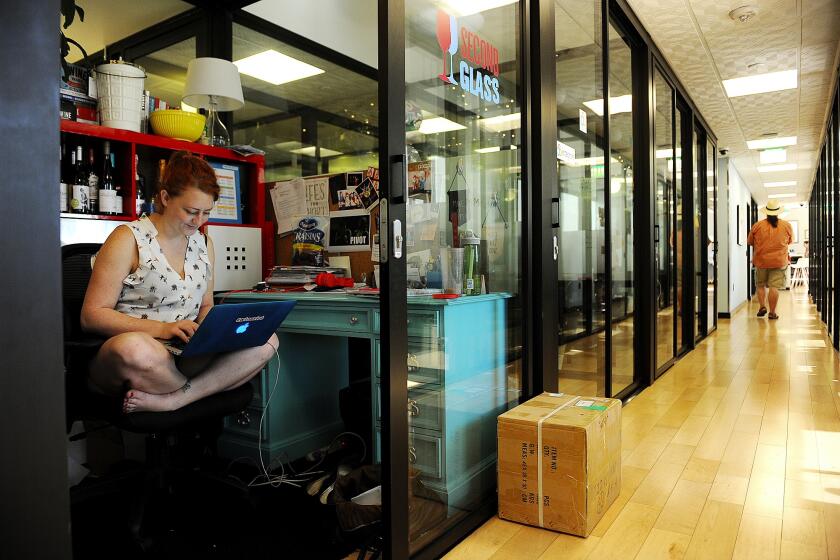Adam Neumann got a sweet $1.6-billion WeWork exit package. It could get sweeter

- Share via
WeWork co-founder Adam Neumann, who left the loss-making office-space provider with a $1.6-billion exit package, could earn hundreds of millions of dollars more under an agreement struck with the company and its top shareholder in October, according to documents reviewed by the Financial Times and people briefed on the matter.
The deal revised the terms of a class of shares held by Neumann — known as profits interests — that were created by the company’s complex restructuring this year and had little value after plans for a WeWork initial public offering fell apart.
But a future offering — even at a valuation significantly lower than the company was seeking this summer — could result in Neumann receiving hundreds of millions of dollars if he sells the stake.
In October, a month after Neumann stepped down as chief executive, he agreed with WeWork and SoftBank, its biggest investor, to forfeit some of his profits interests, while receiving improved terms for his remaining stake, positioning him for future gains.
Nothing about WeWork looks normal, and Wall Street may finally be waking up
The ultimate worth of Neumann’s profits interests depends on what kind of valuation the company would command in the public market if it pulls off a successful offering — which is hardly a given after its aborted IPO this year. The profits interests convert into stock at a value equal to the price of the public shares minus a designated “catch-up price,” making them economically similar to share options.
Under his October deal, Neumann’s “catch-up price” was slashed from $38.36 a share to either $19.19 or $21.05 a share, according to the documents reviewed by the Financial Times. SoftBank valued WeWork at $19.19 a share, or $8 billion, in its rescue financing.
If the company’s share price were to hit $25 in the public market, valuing the company at about $10 billion at today’s share count, Neumann’s profits interests could convert into shares worth about $111 million, according to the documents. At $35 a share, or a $15-billion valuation, they could be worth about $352 million, and at $45 a share, valuing the company at $18 billion, they could be worth about $593 million.
WeWork, SoftBank and Neumann declined to comment.
The profits interests were created last summer following a restructuring that essentially split WeWork in two — an underlying operating company, in which some company insiders received profits interests, and a holding company that would eventually issue shares to the public. The structure conferred tax benefits to the company insiders.
Neumann also owns tens of millions of shares in the holding company and has the right to sell up to $970 million of that stock to SoftBank in the coming months. The profits interests he and other top executives received — including current Co-chief Executive Artie Minson and chief legal officer Jennifer Berrent — represent a separate holding.
Before the October deal, Neumann had 42.473 million profits interests, all with a catch-up price of $38.36 a share. Fewer than 1 million of the profits interests were vested. About 9.4 million were to vest if the company went public, with the remainder vesting when the company hit valuations of $50 billion, $72 billion or $90 billion.
Under the October deal, Neumann received 8.47 million vested profits interests with a catch-up price of $19.19 a share, and an additional 15.6 million profits interests that would vest after an IPO with a catch-up price of $21.05 a share.
WeWork was valued at $47 billion by SoftBank at the start of this year. SoftBank is now offering to buy shares from employees and investors at $19.19 a share, and the company has told employees and investors that the deal “may be the most attractive liquidity event for the company’s stockholders.”
Obstacles to a future WeWork listing include investor concerns about the company’s growing losses and its business model of taking long-term leases on buildings and reletting the space to its own tenants.
The company, which has lost more than $5 billion since 2016, had accrued $49.9 billion of lease commitments to landlords by the end of September, documents showed.
Neumann’s control of WeWork and some of his dealings with the company, including a $5.9-million payment he received for the rights to the trademarked word “we,” were also criticized by the institutional investors who are crucial to an IPO. The co-founder of the company relinquished his role as chief executive in September.
The Financial Times Ltd. 2019. All rights reserved. FT and Financial Times are trademarks of the Financial Times Ltd. Not to be redistributed, copied or modified in any way.
More to Read
Inside the business of entertainment
The Wide Shot brings you news, analysis and insights on everything from streaming wars to production — and what it all means for the future.
You may occasionally receive promotional content from the Los Angeles Times.











